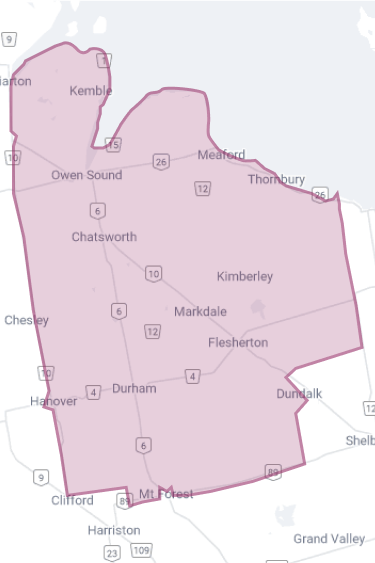Experimental Acres
Experimental Acres is a micro-grant program for on-farm trials of regenerative agriculture. Design your own project, experiment on a small scale, and learn about what works best before scaling up!
Experimental Acres Applications Now Open
Do you farm in Grey County and have an idea for improving soil health and resilience to climate change on your farm? Apply now for up to $3,000 to help you design your own project, experiment on a small scale, and learn about what works best before scaling up! Apply by February 28, 2026.
Experimental Acres 2025 Project Outcomes
In 2025, six local farmers conducted on-farm trials to improve sustainability on their farms. Learn about what they did and learned from in the 2025 Project Outcomes Final Report!
Regenerative agriculture can be practiced in as many ways as there are farms.
Building soil health through regenerative practices contributes to long-term stability in a changing climate. Adopting regenerative practices comes with a learning curve, but Experimental Acres is here to help.
About Experimental Acres
The Experimental Acres is a micro-grant program (up to $3,000) for on-farm trials of regenerative agriculture. Experimental Acres encourages starting small – only use a fraction of land to learn on before scaling up.
Since 2023, the program has supported a total of 19 on-farm trials, directly impacting practices over 440 acres.
Farmers know their land best, which is why participants design their own Experimental Acres project. Each farm has a unique question they are trying to answer, based on their interests and goals. In addition to financial support, we also offer soil testing and community building events.
The program offers a de-risked learning season for testing best management practices to assist in developing a business case for practices worth repeating.
Projects typically fall within the following three categories:
Maintaining soil cover helps reduce soil erosion from wind and precipitation. Example practices include cover cropping, intercropping, and introducing new crops into the rotation.
Integrating animals on the farm can have many benefits to soil health and promote carbon storage in cropland soil. Example practices include rotational grazing, silvopasture, and bale grazing.
The innovation stream is for projects that can benefit soil health and do not fit into other categories. Example practices include tarping to reduce tillage intensity, winter crop rotation, and planting tall grass prairie.
Hear It From the Farmers
Don't believe us? Hear from those who are a part of the Experimental Acres program and learn how they have utilized it to better their farming practices.
2025 Projects
- Exploring alternative grazing sources that can support cattle in hot, dry summer months (15 acres) - Joshua Bye, Meaford
- Creating apple guilds, which are considered a more disease-resistant, higher yield production method (0.5 - 1 acre) - Dr. Cristina Allen, Meaford
- Late-summer seeding hay to maintain living roots and increase soil health (20 acres) - Wade Deaken, Appinbrook Farm, West Grey
- Overseeding turnip to extend fall grazing (up to 230 acres) - Peter Kotzeff, West Grey
- Using pastured poultry to increase soil fertility (0.25 acre) - Gillian Griffin, Flora Grey, Chatsworth
- Trying different mulching practices around fruit trees (1 acre) - Anthony Rabideau, Southgate
For more information, check out the 2025 Project Summaries.
Past Projects
- Interseeding Corn with Cover Crops and Strip Grazing - Peter Kotzeff,
- Interseeding Sweet Corn in an Organic Market Garden - Devan Penney, Fair Fields Organics
- Dragline Manure Application - Wade & Anne Deaken, Appinbrook Farms
- Continued Monitoring of 2023 Winter Bale Grazing – Brenda Hsueh, Black Sheep Farm
- Pastured Swine and Poultry – Amanda Deschambeau, Braided Dalea Farm
- Pasture Amendment Using Wool Pellets – Jennifer Osborn, All Sorts Acre
- Cross-Seeding for Erosion Control - Don Swindell, Vinegar Hill Farm
- Grazing chickens resting market garden land that is planted with cover crops – Cory Eichman, Saugeen River CSA
- Rotational grazing for bison on annual cover, to fit into rotation with vegetable production – Eric & Stephanie Mayne, Fortitude Bison
- Intercropping corn silage with annual ryegrass and berseem clover – Jamie Farrell, Hi Hope Holsteins
- Multi-species rotational grazing – Adam and Callee, The Middle Farm
For more details about past projects, check out the 2023 Project Outlines or 2024 Project Outcomes Report.
Background
The Experimental Acres program was developed as a part of Guelph-Wellington Our Food Future, a project funded by Infrastructure Canada. The County of Wellington facilitated the program in Wellington and Dufferin Counties in 2022, and Grey County joined in 2023. The 2024 program was administered by Grey Agricultural Services.
Start Experimental Acres in your community!
Check out our Experimental Acres Handbook for a step-by-step guide on how to start this program in your municipality.




